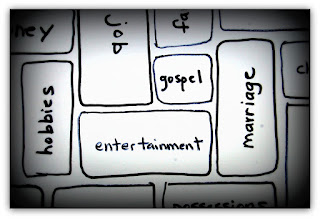I hesitated about posting today's homily, since it's little more than a rewrite of the words of Father S. Joseph Krempa, from his book "Captured Fire: The Sunday Homilies, Cycle C." Father Krempa is a master homilist and I'm rarely able to improve on what he says or how he says it. Nonetheless, I decided to post these unoriginal thoughts anyway, with my admiration and thanks to him. On Amazon.ca, the three-volume set of his homilies is only available for download to Kindle but the books may be purchased in the U.S. on Amazon.com.
Channel surfing. It’s something we all do. We use the remote to run through the channels, stopping here and stopping there as this or that holds our attention for a while.
Our life can be like that. It's called compartmentalization. One compartment's our job. Another’s our family life. A third is our Church. Another is our life as citizens and voters. Every day we switch from one channel to another without connecting them.
Putting things in compartments sounds like a pretty good idea; it keeps things tidy. However, psychologists call compartmentalization a defense mechanism. It’s not healthy behavior at all.
Someone whose actions reflect their deepest convictions is an integrated person—from the Latin word for whole. In every aspect of life, the integrated person is guided by one set of values, one set of personal convictions.
By contrast, when we separate parts of ourselves from other parts, acting as if we had separate sets of values, we are disintegrating—moving away from wholeness.
Today, our readings take aim at compartmentalization. They ask us to wrestle with our tendency to keep what we believe in a different box from how we think and act in everyday life.
In the first reading, the Old Testament prophet Amos gives us a snapshot of some merchants, bored to death at the synagogue, waiting for the service to end so they can get back to cheating and shortchanging people. They’re a classic example of compartmentalization, separating their religious duties from their work.
You’ve all heard sermons on this. We know it’s crucial that our faith influences our decisions and behavior at work or school. That’s familiar Christian teaching. Most of us aren’t so compartmentalized that we forget we’re Catholics when we head off to work; most of us have a pretty good idea what our faith demands of us in our various kinds of employment, whether we got it from the Ten Commandments or from the social teaching of the Church.
But the first reading is just a warm-up. The second reading, from St. Paul’s Letter to Timothy, takes us a bit deeper into the subject. Many of us watch politics on a channel that’s far distant from our beliefs.
I can say that because I still remember research I did as a political science student at UBC, more years ago than I care to remember. Catholic voting behavior was largely based on family voting history, not on issues.
Much has changed in Canadian politics since then, but it’s safe to say that issues of great importance to Catholics still do not, by and large, make a great difference to how they vote. “I’m a Liberal,” or “I’m a Conservative,” or “I’m a New Democrat” can be the same as saying “I don’t let my beliefs get in my way at the ballot box.”
Quite rightly, the Church doesn’t tell Catholics who to vote for. But it tells them how to vote—with prayerful consideration of the issues in the light of faith. And St. Paul tells us another way to let faith influence our lives as citizens. He urges us to pray for those who get elected: first, because they need our prayers, and second, because our lives as citizens cannot be in a different compartment from our Christian lives.
Finally, we get to the Gospel. It’s a bit confusing. Is Jesus praising the dishonest manager? If he is, it’s only to get our attention. The manager knows that money used wisely makes a difference, even when it’s used dishonestly.
If Jesus commends the crooked employee’s efforts to secure his future by using someone else’s cash, what might he be saying to us about the way we use our own money?
Before answering the question, let me throw out a few others. Do we put as much thought into planning our spiritual lives as we do when planning our finances? Do we put more effort into taking care of our bodies than in caring for our souls?
Many people think nothing of hitting the gym two or three times a week, but can’t find time for church or personal prayer. Others have read several books about nutrition, investment planning or retirement—but not one about prayer or the spiritual life. Take a moment now and ask yourself the titles of the last three non-fiction books you read.
We attend seminars on real estate trends but never a Bible study.
All of this, for those who believe the message of Jesus and his promise of eternal life, counts as compartmentalization. I’m not saying, of course, that we shouldn’t keep fit, plan for retirement, or eat wisely—far from it. But faith needs to shape everything we do.
This means we must show the same ingenuity, planning and effort in our spiritual lives as we do in other aspects of life. And this includes our finances. The message Jesus gives us in the curious parable today is that we should imitate the dishonest steward not in his dishonesty but in his wise use of money to secure his future.
For the Christian, this means knowing that the soul is the most important investment we make. Sacrificial giving to the Church, other charities, and our community pays an eternal dividend. The same can be true about estate planning. And money spent on Catholic education, which we support today through our second collection, is a perfect example. It’s a spiritual investment in youth—and in our own eternal future.
Today’s readings began with the obvious: what you believe must govern what you do—at work, at home, at school. It’s contradictory at best and hypocritical at worst to say “well, that’s how the world works” to justify dishonest practices at work or cheating at school.
But the Gospel takes us to a more demanding challenge—breaking down every compartment so that our spiritual priorities shape our financial ones. That calls for some soul-searching and prayerful thinking.
A few years ago they came up with a dual channel TV. You could watch one program at the same time another one—usually sports—played in a smaller box on the screen. It was marketed as a way of saving marriages!
I’m not sure the gizmo caught on, but it’s a great way to think about the message of today’s Scriptures. Whatever we’re doing, our faith in Christ needs to be on the screen, guiding and shaping even the smallest or most worldly choice or decision.





